 Petzlover
Petzlover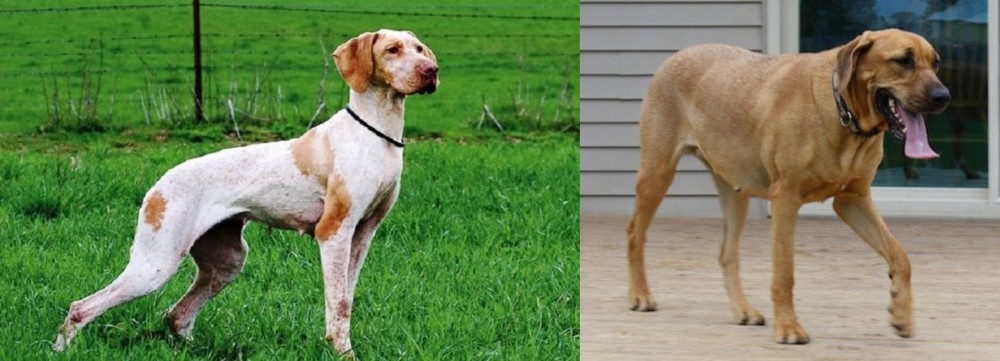 Ariege Pointer is originated from France but Danish Broholmer is originated from Denmark. Ariege Pointer may grow 8 cm / 3 inches shorter than Danish Broholmer. Ariege Pointer may weigh 30 kg / 66 pounds lesser than Danish Broholmer. Ariege Pointer may live 3 years more than Danish Broholmer. Both Ariege Pointer and Danish Broholmer has almost same litter size. Ariege Pointer requires Low Maintenance. But Danish Broholmer requires Moderate Maintenance
Ariege Pointer is originated from France but Danish Broholmer is originated from Denmark. Ariege Pointer may grow 8 cm / 3 inches shorter than Danish Broholmer. Ariege Pointer may weigh 30 kg / 66 pounds lesser than Danish Broholmer. Ariege Pointer may live 3 years more than Danish Broholmer. Both Ariege Pointer and Danish Broholmer has almost same litter size. Ariege Pointer requires Low Maintenance. But Danish Broholmer requires Moderate Maintenance
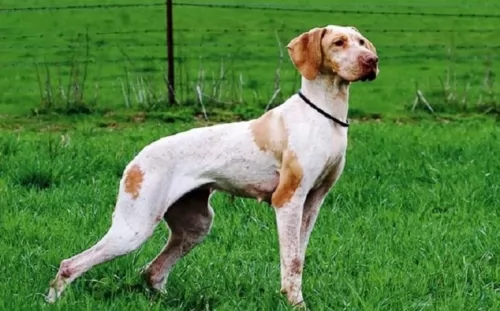 The Ariege Pointer is a French hunting dog, coming from the Ariegeois region of France.
The Ariege Pointer is a French hunting dog, coming from the Ariegeois region of France.
Known as the Ariege Pointing Dog, French Pointer or Braque de l’Ariege, these dogs came from the old French Braque dogs that were crossed with the orange and white Southern Braques.
It was in 1990 that a team of breeders decided to devote themselves to the breed’s survival. The Braque de l’Ariege was recognized by the United Kennel Club in 2006.
 The Danish Broholmer is also known as the Danish Mastiff. This is a large dog which comes from Denmark.
The Danish Broholmer is also known as the Danish Mastiff. This is a large dog which comes from Denmark.
Known as a molosser breed, the dog used to fulfill a guard dog role in the home of wealthy Danish people. There are those who take one look at the dog’s size and build, and regard him as aggressive, when in fact he is a calm, good-tempered dog.
The origin of this large dog breed goes way back to the Middle Ages, although details of the dog’s origins are unknown. The Broholmer comes from mixing the English Mastiff and various local German breeds, being named after the Sehested of Broholm.
The dog all but became extinct during the Second World War. It was in 1974 that the Danish Kennel Club started looking to revive the breed. The breed was revived and the dog was imported to the United Kingdom in 2009. The Danish Broholmer has been recognized by the United Kennel Club in 2006.
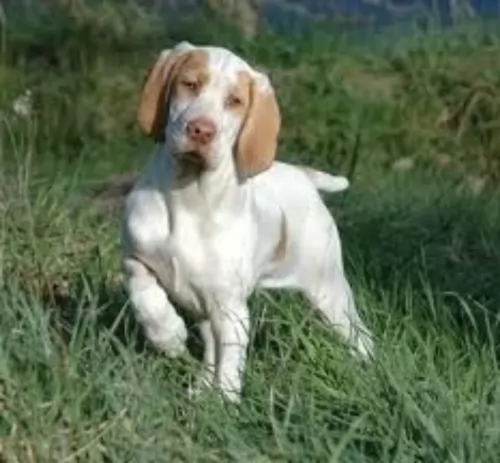 The Ariege Pointer has always been a dog kept essentially for hunting and not as a companion dog. He stands between 55 – 67cm and weighs 25 – 30kg.
The Ariege Pointer has always been a dog kept essentially for hunting and not as a companion dog. He stands between 55 – 67cm and weighs 25 – 30kg.
He is an attractive looking dog with quite a large head while the body is sleek and slender to look at. The ears are quite large and are floppy while the tail is traditionally docked to give him that distinctive look. These days the tail is often left long and hangs downwards.
The coat is short, single and rough and is white with tan or orange patches. The coat can also be speckled or ticked.
The Ariege Pointer is a hunting dog who is friendly towards strangers and therefore won’t make a particularly good watchdog.
These dog are lively, independent and good natured and they make excellent companion dogs. They are fairly docile and and get on well with children and pets in the home. Just like with any other dog, they need to be trained and socialized early.
 The Danish Broholmer is a large dog that looks familiar to the Mastiff. The dog stands roughly between 66 and 75cm and weighs between 40 and 60kg.
The Danish Broholmer is a large dog that looks familiar to the Mastiff. The dog stands roughly between 66 and 75cm and weighs between 40 and 60kg.
The body is strong and muscular and he has the large head of the molosser. The coat of the dog is short and harsh, with the color being fawn, light brown, yellowish or black. He is quite a heavy shedder and will require brushing twice a week.
The dog usually has a black mask.The muzzle is also large, the nose black. His ears are medium-sized, set high and floppy, the chest deep. The tail is long and carried downwards.
The Danish Broholmer is an awesome family pet who seems to go out of his way to please his human family. He is an intelligent dog and obedient by nature. Because he is so devoted to his human family, he wants to protect them too.
He is a non-aggressive dog and the best part about owning such a dog is that he is a gentle pet for the family but he still looks threatening to intruders.
The Danish Broholmer gets on well with children and pets in the home. However such a big dog needs to be trained and socialized and he could jump up against smaller people and unintentionally send them flying. Training will see to it that he responds well do simple commands such as ‘down’, ‘sit’, lie-down’ and ‘come’.
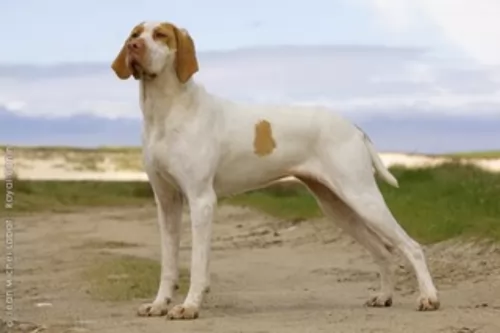 The Ariege Pointer has always been an excellent pointing- and hunting dog. When it comes to being a family pet, he puts his hunting skills aside and becomes a loyal, loving, friendly pet.
The Ariege Pointer has always been an excellent pointing- and hunting dog. When it comes to being a family pet, he puts his hunting skills aside and becomes a loyal, loving, friendly pet.
They are considered to be rare dogs, and were at one time bordering on extinction. Those who have owned one of these hunting dogs will be glad to know that they are no longer considered endangered. They’re not your friendly, social kind of dog that you find in other dog breeds, but with training and socialization he will make a fine companion and family friend.
 Once people have owned a Danish Broholmer, they have got nothing but good comments about them. You hear words such as courageous, sweet, good-natured, playful and intelligent. Also if he believes his family is in danger he will want to protect them.
Once people have owned a Danish Broholmer, they have got nothing but good comments about them. You hear words such as courageous, sweet, good-natured, playful and intelligent. Also if he believes his family is in danger he will want to protect them.
He is a great friend for child and adult and a fairly low maintenance breed too. He is an adaptable dog, but his size isn’t suited to small, cramped spaces. He will need to be exercised but this should be a pleasure as every human being can use some additional exercise themselves if they want to remain healthy.
Look after your wonderful amicable Danish Broholmer and he’ll shower you with his doggy love and devotion.
 The Ariege Pointer is a working dog breed, used for hunting and retrieving prey. With good care the dog can live to be a good 12 – 15 years of age.
The Ariege Pointer is a working dog breed, used for hunting and retrieving prey. With good care the dog can live to be a good 12 – 15 years of age.
However, with every dog breed there are common dog diseases to watch for. This dog has long floppy ears and these can get damp and will need to be cleaned and dried regularly otherwise the long ears can be prone to infection.
Apart from being prone to health issues such as an ear infection, you want to be aware of very common dog ailments such as hip dysplasia which can cause lameness in your dog.
Whatever illness your dog has, and you see he isn’t acting his usual self, get him to the vet for a check-up and then make sure that all treatment and medication prescribed is adhered to.
 The Danish Broholmer is a large dog who can consume quite a lot of food. With large dogs like these, there is often strain on the dog’s joints.
The Danish Broholmer is a large dog who can consume quite a lot of food. With large dogs like these, there is often strain on the dog’s joints.
Also dogs with deep chests are also prone to gastric dilatation volvulus or bloat. In fact, large dogs can also suffer with obesity apart from joint problems. It is why they often live shorter lives than smaller dog breeds. Some points to consider with your large breed pet -
Nutrition is most important for puppies and your adult dog. Don’t overfeed your large breed puppy as he can grow too quickly so that his joints are at risk of injury.
Too much weight gain as well as too much exercise can increase the risk of your dog developing hip dysplasia. This is a hereditary disorder, causing problems with the hips. The disease can lead to terrible pain and sometime lameness. Always remember to keep the weight of your dog in a healthy range to prevent pressure on the joints.
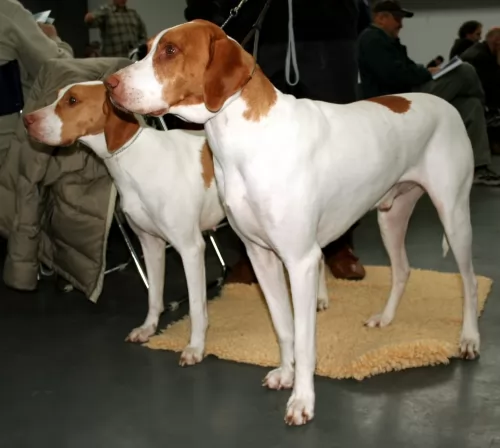 Your attractive Ariege Pointer will give birth to 2 – 8 puppies. If you don’t want puppies, then spaying or neutering is excellent and can actually have many health benefits for your pet.
Your attractive Ariege Pointer will give birth to 2 – 8 puppies. If you don’t want puppies, then spaying or neutering is excellent and can actually have many health benefits for your pet.
This dog with its short coat requires very little maintenance, and a good brush twice a week will ensure the coat remains glossy and shiny, giving you the chance to also check for fleas and ticks.
Don’t just assume every dog has bad breath. Bad breath can be indicative of dental disease, and dental problems can cause all kinds of other illnesses within the body. Make sure that while your pet’s teeth are healthy, that you brush them 2 or 3 times a week with special canine toothbrush and toothpaste.
The Ariege Pointer requires regular exercise as it is a lively, energetic dog. He can adapt to life in the city or the country, but ideally he needs a place with a large garden.
Wherever you keep him as a pet, make sure you take him for walks every day and that you play ball- or rope games with him. Ignoring his exercise needs will turn him into a bored, frustrated pet, and that isn’t fair towards him.
Make sure you choose good quality commercially manufactured foods for him. Adding in some home-made food to his kibble such as cooked brown rice, vegetables and chicken will be wonderfully good for him.
Every dog will require some raw meat added into his diet from time to time. Many skin diseases can be treated by adding in raw meat. After all, before dogs were domesticated they lived on raw meat, and including this ingredient back into their diet guarantees to make a remarkable difference in terms of good health.
 For his size, you’d be inclined to think that the Danish Broholmer will require a lot of exercise, but in fact he is much like any other other. He will love to join you on your daily walks and will readily run to fetch a ball.
For his size, you’d be inclined to think that the Danish Broholmer will require a lot of exercise, but in fact he is much like any other other. He will love to join you on your daily walks and will readily run to fetch a ball.
Your Danish Broholmer will require quality food manufactured exclusively for large dog breeds.
There are excellent manufactured dog foods out there and you can take the kibble and mix in some home-made foods from time to time such as cooked brown rice, vegetables and chicken. He will also require some raw meat added into the diet occasionally.
Never leave him without a constant supply of cool, fresh water.